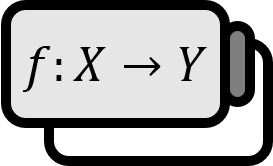Derivatives of Logarithmic Functions
Formulas
The derivative of a logarithmic function with base $e$ is as follows.
$$ \begin{equation} \dfrac{d \log x}{dx}=\dfrac{1}{x} \end{equation} $$
The derivative of a composite logarithmic function is as follows.
$$ \begin{equation} \dfrac{d \left( \log f(x) \right)}{dx} = \dfrac{f^{\prime}(x)}{f(x)} \end{equation} $$
Explanation
Especially, $(2)$ is used as a useful substitution trick.
Derivation
$(1)$
By the definition of logarithmic functions, the following equation holds.
$$ x = e^{\log x} $$
Differentiating both sides results in the following, by the derivative of the exponential function and chain rule.
$$ \begin{align*} 1 &= \dfrac{ d \left( e^{\log x} \right) }{dx} \\ &= \dfrac{ d \left( e^{\log x} \right) }{d \log x} \dfrac{d \log x}{dx} \\ &= e^{\log x} \dfrac{d \log x}{dx} \\ &= x \dfrac{d \log x}{dx} \end{align*} $$
$$ \implies \dfrac{d \log x}{dx} = \dfrac{1}{x} $$
■
$(2)$
By the definition of logarithmic functions, the following equation holds.
$$ f(x) = e^{\log f(x)} $$
The remaining process is the same as above.
$$ \begin{align*} f^{\prime} &= \dfrac{ d e^{\log f(x)}}{dx} \\ &= \dfrac{ d e^{\log f(x)}}{d \log f(x)} \dfrac{d \log f(x)}{dx} \\ &= e^{\log f(x)} \dfrac{d \log f(x)}{dx} \\ &= f(x) \dfrac{d \log f(x)}{dx} \end{align*} $$
$$ \implies \dfrac{d \log f(x)}{dx} = \dfrac{f^{\prime}(x)}{f(x)} $$
■
